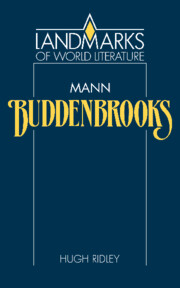Book contents
- Frontmatter
- Contents
- Acknowledgements
- Chronology
- Chronology of Buddenbrooks
- 1 Life and works
- 2 Retrospect on the nineteenth century
- 3 The evolution of the novel
- 4 The theme of decline
- 5 Stages in decline
- 6 Thomas Buddenbrook
- 7 Narrative technique
- 8 The Buddenbrooks' decline: a typical story?
- 9 Literary background and reading public
- 10 Buddenbrooks and the ‘crisis of the novel’
- Suggestions for further reading
3 - The evolution of the novel
Published online by Cambridge University Press: 15 December 2009
- Frontmatter
- Contents
- Acknowledgements
- Chronology
- Chronology of Buddenbrooks
- 1 Life and works
- 2 Retrospect on the nineteenth century
- 3 The evolution of the novel
- 4 The theme of decline
- 5 Stages in decline
- 6 Thomas Buddenbrook
- 7 Narrative technique
- 8 The Buddenbrooks' decline: a typical story?
- 9 Literary background and reading public
- 10 Buddenbrooks and the ‘crisis of the novel’
- Suggestions for further reading
Summary
Buddenbrooks is the product of a short span of years. The first page is dated October 1897, the last page was written in mid-July 1900. In contrast to the twelve years which The Magic Mountain took to write, the composition period of Buddenbrooks is both short and homogenous.
Even within these few years, however, Mann's intention for the novel passed through three distinct phases. While Mann himself felt, as we have seen, that he reached self-assurance in his use of the medium of narrative writing with the story ‘Der kleine Herr Friedemann’, and while it is evident that a remarkable number of Mann's first thoughts found their way into the final form of the novel (so that it is not helpful to think of Buddenbrooks changing its emphasis because of Mann's inexperience as a novelist), nevertheless Mann's intentions shifted during the writing of the novel, and with this shift of intention came also a shift in literary genre. This shift should not be misunderstood as a sign of Mann's personal uncertainty: rather it was the youthfulness or immaturity of the social novel in Germany that did not enable Mann to put his themes across within an established genre. This was an aspect of the novel in Germany on which many of the early reviewers of Buddenbrooks were agreed. We shall see later that Mann rejected many aspects of the popular German tradition in the novel, and despite the major achievements of Theodor Fontane (1819 – 98) within the field of the novel of polite society – known and appreciated by Mann as he worked on his own novel – Mann had to look outside the German tradition for literary models.
- Type
- Chapter
- Information
- Mann: Buddenbrooks , pp. 20 - 28Publisher: Cambridge University PressPrint publication year: 1987

